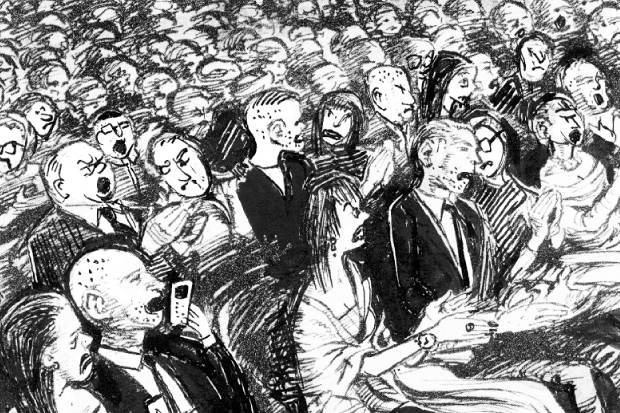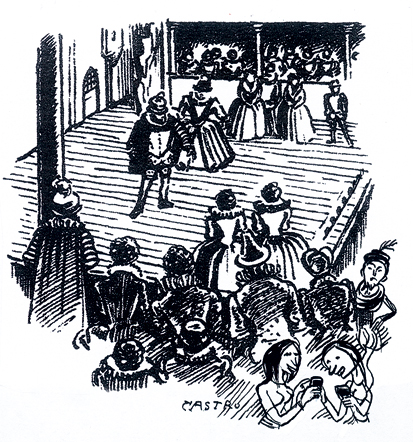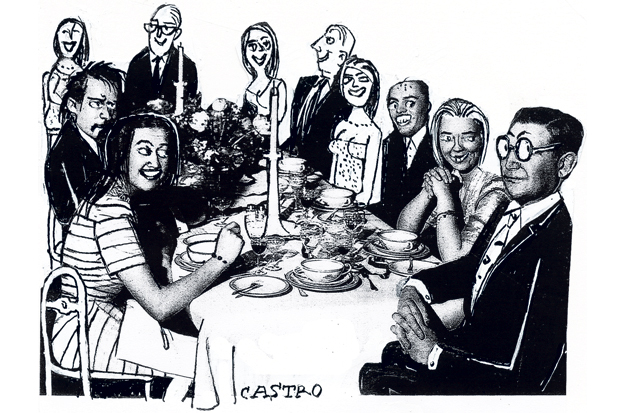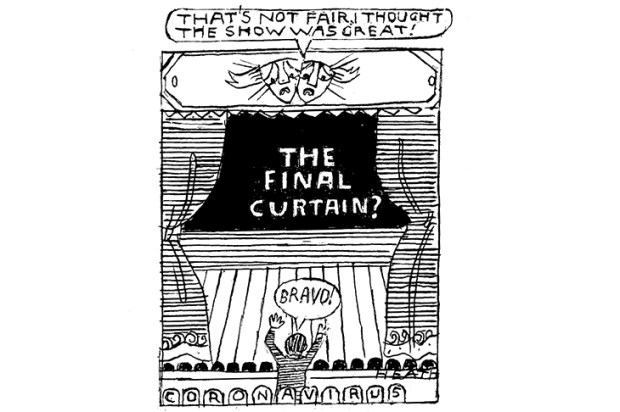The nicest day of the year was spent at Charleston in May. The Sussex farmhouse shared by Duncan Grant and Vanessa Bell looked splendid in the streaming sunshine. As a dramatist, I’ve idly disparaged bald and white-haired audiences. But as soon as I started speaking at the literary festival, I realised that everyone in panama hats and cardigans was way to the left of me. The first question was about my local childhood, and I said that growing up so close to the Channel meant that stories of people like Bernard Shaw and Virginia Woolf sitting on English lawns and hearing the sound of battle in the first world war from across the water had always moved me. When I added that you couldn’t be born in Sussex without feeling profoundly European — and that a historical hostility to Europe therefore mystified me — I was cheered to the rafters. An odd inversion of the expected state of affairs: the oldest generation is now the most progressive.
In France, where constitutions are taken seriously, protocol says that the director of the Comédie-Française is the 25th most important person in the land. At the president’s state dinners he or she must be seated appropriately. I had always imagined that the Poet Laureate was an official position, not conveying power, but conferring status. Apparently not. When Chris Grayling instituted his vindictive policy of forbidding outsiders to send prisoners books, he refused to take a meeting with Carol Ann Duffy. His motives were clear. The poor guy doesn’t have a shred of an argument and he can’t face expertise. But why, constitutionally, was Grayling allowed to get away with it? If ministers feel obliged courteously to take advice from the Queen’s son, why do they feel free to insult the Queen’s poet?
Further evidence that I’m going soft in the head is that I find myself agreeing with a critic. The Guardian’s Peter Bradshaw remarks that space films worked brilliantly in the 1960s when we all believed space travel would broaden the human mind. But now that the conviction behind this belief has died, films in the genre are simply exercises in style. He’s right. To quote another critic, Pauline Kael, modern movies have style to burn, and that’s what they should do — burn it. Three good films I’ve seen lately have all been outside genre. Marion Cotillard gives a spellbinding performance as a woman thrown out of work in Two Days, One Night, while Rebecca Lenkiewicz wrote the screenplay of the year to elevate Pawlikowski’s Ida to something way better than anything the director’s ever achieved without her. Best of all is Winter Sleep, a masterpiece. It’s an Anatolian re-setting of Chekhov. Not a genre you can reduce to style.
The National Theatre has just been rebuilt: more theatres? more plays? more rehearsal rooms? No — more restaurants, and bars. Do people guzzle more these days, or do they just guzzle more in public? Is guzzling the only way to get people to look at art? The chef at the Berners Tavern, Jason Atherton, has said that restaurants are drawing as many tourists to the capital as theatre. I’ve never eaten at one of Atherton’s joints, but I doubt his cooking is as rich and sustaining as Lesley Sharpe in A Taste of Honey or Howard Davies’s production of The Silver Tassie. Peter Brook, radical as ever, offered only hard boiled eggs with salt in the café at Les Bouffes Du Nord in Paris. The theatre was packed.
In an ill-judged speech in October, the Travelex founder Lloyd Dorfman reopened the theatre renamed after him by declaring the National Theatre to be a £100 million business. He could not be more wrong. Generations of idealists fought for public subsidy precisely to remove theatre, as an art form, from commercial demands. That’s why the struggle was so long and the victory so heady. Dorfman then thanked corporate sponsors for making the theatre possible. You could feel his audience bristle. For the last 50 years the most generous contributors have been you and me, through our taxes. We have paid for the National. It belongs to us. Private philanthropy may have provided a little icing but we made the cake. It’s only because our current Prime Minister, Chancellor and Culture Secretary don’t understand duty of care or public responsibility that further fund-raising has been necessary. The National Theatre is there to lead public taste, not to follow it. Occasionally it may launch productions which turn out to be profitable, but principally it aims to fulfil a more urgent remit: to animate both the world repertory and the modern. If it dwindles to a point where it is simply an unfairly subsidised competitor with the West End, it will deserve to die.
Got something to add? Join the discussion and comment below.
Get 10 issues for just $10
Subscribe to The Spectator Australia today for the next 10 magazine issues, plus full online access, for just $10.
You might disagree with half of it, but you’ll enjoy reading all of it. Try your first month for free, then just $2 a week for the remainder of your first year.














Comments
Don't miss out
Join the conversation with other Spectator Australia readers. Subscribe to leave a comment.
SUBSCRIBEAlready a subscriber? Log in